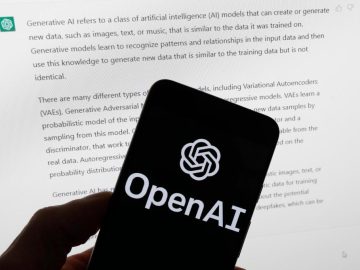Thereâs a joke in one of my favorite movies, âReal Genius,â which feels directly applicable to a lot of AI discussions weâre having today. (Itâs an â80s movie, so itâs not a sceneâitâs a montage, set to âIâm Fallingâ by The Comsat Angels.)
In it, our protagonist Mitch attends a normal math lecture, but over the course of the montage most of the class is replaced by tape recorders of various sizes. In the final shot, Mitch enters the lecture hall to discover that a large reel-to-reel tape player has replaced the professor himself. Itâs just one tape recording being played into all the other tape recorders.

One of the announced features for Apple Intelligence, Smart Reply, will offer quick ways to respond to direct queries in email, asking you simple questions (âDo you like me? Check yes or no.â) and drafting a reply for you.
Apple is hardly the first company to suggest that in the future, your phone will write your emails for you. Gmailâs Smart Compose has been doing it for several years, and Appleâs been offering its own version of multi-word autocomplete for almost a year.
But with this latest round of AI announcements, once again, Iâve heard a lot of people making jokes about how, pretty soon, your AI will email my AI, and humans will never need to be involved anymore! Itâs usually meant as absurdity, but I think there might be more to it than that.

Suppose our AIs end up emailing each other endlessly, striking up meaningless conversations and having their own inner lives. In that case, that might make for an interesting science fiction story, but Iâm not sure it would really matter to us as humans. Think of it this way: email is just a communication pathway. It was built for humans to talk to each other, but for years now, weâve received automated emails, newsletters, spam, and the rest.
If you know much about tech, youâve heard of APIs, or Application Programming Interfaces. APIs are, at their most abstract level, an agreed-upon method for software to use or communicate with other software. APIs are in the cloud, on the web, on our devices, everywhere. So why not in our email messages, too?
I realize that itâs absurd to consider that a free-form email message would ever be better than a programmed API, but email has a flexibility that other APIs donât. Emails can be about literally anything. And a lot of times, APIs are just not well used because the people who would use them are lazy, busy, uninterested, or donât know they exist.
Letâs say you need to find a common meeting time for you and four other people. Are there internet calendar APIs for this? Yes! Are there calendar apps that feature built-in support this sort of scheduling? Yes! Are there literally web apps that will do this work for you? Yes! (I use StrawPoll, myself.) And yet, Iâd bet that most people just⦠send an email to everyone asking them if they can make a certain time and try again until they get it right. Itâs not efficient, but it is convenient.

Now imagine that same scenario, but everyone is using an AI system thatâs reading email and has access to each userâs calendar. The end result might be the same as using an existing API or web app, but instead email messages among AIs are sorting it out. Maybe some AIs know exactly when their person is available; others might need to ask. But instead of the onus being on the users to interface with other systems and bring it all together, the AIs handle most of it and the user just chimes in when itâs necessary.
I donât think thatâs an absurd scenario. (And yeah, if the AIs are particularly intelligent, maybe theyâll use an existing calendar service to solve the problem up front.) Itâs the equivalent of each of those people having their own human assistant setting up the meetingâexcept none of them likely have the budget to hire a personal assistant.
In fact, where AI assistants really run into trouble is not when theyâre talking to other AIs, but when theyâre talking to human beings. Remember when Google showed off its service that pretended to be a human and called real people to verify Google Maps data or make reservations? Thatâs what I really dread: being battered by emails and texts and phone calls from AIs operating for people and organizations who want my attention but arenât willing to give me any of their own.

As long as I, a human, donât have to read a pile of AI-to-AI email communications, I donât mind if they have them. The protocol doesnât really matterâuse iMessage or RCS, for all I careâso long as the job gets done and Iâm not left to clean up the mess. Keep me out of it, other than answering questions or making my own requests.
Email and text messages may be a stupid way to build an interconnected web of AI software systems, but history has frequently shown us that sometimes the easiest solution is the one thatâs available, not the one thatâs the most elegant.
If you appreciate articles like this one, support us by becoming a Six Colors subscriber. Subscribers get access to an exclusive podcast, members-only stories, and a special community.





